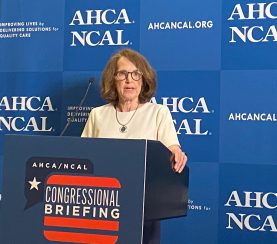LeadingAge Joins AHCA and Others in Lawsuit to Stop Nursing Home Mandate
June 4, 2024
 WASHINGTON, DC — According to a press release, LeadingAge president/CEO Katie Smith Sloan has met with long-term care associations and nursing home providers here in the nation’s capital to explain why the Centers for Medicare and Medicaid Services’ final nursing home staffing rule must not be implemented and policymakers must shift focus to support policies that will ensure funding and support for the long-term care workforce.
WASHINGTON, DC — According to a press release, LeadingAge president/CEO Katie Smith Sloan has met with long-term care associations and nursing home providers here in the nation’s capital to explain why the Centers for Medicare and Medicaid Services’ final nursing home staffing rule must not be implemented and policymakers must shift focus to support policies that will ensure funding and support for the long-term care workforce.
Sloan spoke alongside leaders from the American Health Care Association, the National Rural Health Association, National Association of State Veterans Homes, and providers including Good Samaritan Society, where she emphasized the commitment of LeadingAge’s nonprofit and mission-driven provider members — many of whom have served their communities for decades and even more than a century — to ensure quality care in nursing homes.
“We know, deeply, the essence of caregiving,” Sloan said. “We fully share the Biden Administration’s goal. At the same time, we have made clear that our current infrastructure of long-term care cannot sustain staffing mandates until they are supported by adequate funding and available staff. We know that quality care and staffing are tightly connected. Without the nurse aides, registered nurses, licensed practical nurses and others who serve nursing home residents, there simply is no care. LeadingAge has shared its intention to join with AHCA in the lawsuit to stop these mandates, which we oppose, because it does not acknowledge the interdependence of funding, care, staffing, and quality.”
Becoming a co-plaintiff is one tactic of LeadingAge’s multi-faceted approach to stopping the mandates and achieving the shared goal of ensuring quality nursing home care.
“We need real policy solutions and investments, not mandates,” she added. “We are drawing on every available tool — legislative, legal, and regulatory — to stop this rule’s implementation and to address the fundamental issue of building the long-term care workforce.”
Sloan went on to outline a range of needed policy actions to address this sector’s issues, including:
- Align reimbursement to the actual cost of care, including paying staff a living wage.
- Support education and training: These are highly specialized jobs that need to be supported through ongoing education and training, including aligning federal and state training requirements and lifting limits on clinical training sites.
- Fix our immigration system to allow more foreign-born workers to come to the United States.
Sloan further emphasized the urgency to take action, explaining how LeadingAge —whose members span the care continuum — can speak from firsthand experience of the broad impact these mandates will have on older adults’ and families’ ability to access needed care and services.
“Just as we are seeing people unable to access nursing home beds, we are seeing the same happen to those seeking hospice and home health services,” she said at the meeting.
“We need to stop the mandate and address long-term care workforce needs.”
LeadingAge represents more than 5,400 nonprofit aging-services providers and other mission-driven organizations serving older adults that touch millions of lives every day. Alongside its members and 36 partners in 41 states, LeadingAge uses advocacy, education, applied research, and community building to make America a better place to grow old. Its membership encompasses the entire continuum of aging services, including skilled nursing, assisted living, memory care, affordable housing, retirement communities, adult day programs, community-based services, hospice, and home-based care.